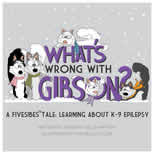University of Missouri College of Veterinary Medicine
Canine Epilepsy DNA Research
Canine epilepsy is one of the most emotionally devastating problems facing dog owners and breeders today. A consortium of researchers from the University of Missouri, University of Minnesota, Ohio Sate University, and the Animal Trust (England) are currently doing DNA research to try to locate the mutation(s) responsible for causing epilepsy in dogs. The genes controlling seizure problems in dogs are not well understood, but this project is attempting to find the marker(s) or mutation(s) responsible.
When these can be identified, a blood test will tell if an individual
dog is a carrier, clear, or likely to become an affected (even
before symptoms begin). Using this information, breeders can choose
breeding partners who will not produce additional affected puppies.
Researchers working on this project need information from affected dogs and their families. Specifically, what is needed is a 3- to 5-generation pedigree of the litter where an affected dog (or dogs) appeared, and blood samples from the affected dog(s), all full siblings, parents, and when possible, the grandparents. More distant relatives are potentially useful, but the most important samples are from the affected dogs, their siblings, and parents. Family groups are important so that the genotype of the affected dogs can be compared to that of close relatives who are not affected, and allow researchers to decipher how these genes are inherited from one generation to the next. An affected dog with little or no family available may also be of some use.
Participatio in the project is confidential - the names of dogs and owners who participate in the research will not be revealed. When the research produces results, individual owners will be able to request the results of testing on their own dogs. Results of research are published in such a way that the identity of individual dogs is anonymous.
There is a packet of information sheets and forms for submitting samples. You may make copies and distribute them to other interested breeders and owners. The packet can be downloaded at the Canine Epilepsy Network website, http://www.canine-epilepsy.net or, upon request, may be faxed or mailed to you. A grant from the AKC Canine Health Foundation (Active Grant #1845) allows participation in this research to be opened to affected dogs and their families in ALL breeds of dogs, at no cost to the owners or the breed parent clubs. As of March 1, 2000, samples have been received from over 1200 dogs representing 35 different breeds. Within a year, researchers are looking for samples from families representing at least 50 breeds. It is hoped that information discovered in one breed may help locate mutations in another. Please spread the word oo this research to anyone who has an affected dog or a relative of an affected dog, and to veterinarians and others who may come in contact with other dogs and owners who should be included. There is no cost to participate, other than a vet fee for drawing a blood sample (many vets are doing this at a reduced cost to support the research) and overnight shipping charges to the lab ($15-$35 from most places in the country via FedEx, UPS, or US Mail). If you have any questions, or need additional information, please contact project coordinator Liz Hansen via one of the methods listed below. Thank you for your interest and participation!
Liz Hansen
Coordinator of Veterinary Information
Dr. Gary Johnson's lab - Dept. of Vet. Path.
209A Connaway Hall
College of Veterinary Medicine
University of Missouri
Columbia, MO 65211
573-884-3712 (office)
573-884-5414 (department fax)
hansenl@missouri.edu (office
email)
VetGen Has been Awarded Grants from the National Institute of Health and the AKC Canine Health Foundation to Study Canine Hereditary Epilepsy
VetGen, the world's leader in veterinary genetic disease research and test development, will focus on discovering new disease genes responsible for hereditary epilepsy in dogs and humans. This research will be funded by a NIH grant entitled "Canine Gene Discovery and Epilepsy Therapy" as well as funds from the AKC Canine Health Foundation. Dr. George Brewer, VetGen's Scientific Director is the Principal Investigator. The goal is to develop a linked gene marker to one or more canine epilepsy genes. Developing such linkages is expected to lead to new gene discoveries benefiting both therapy in humans and genetic testing in dogs. VetGen will focus on collecting samples from families of Collies and Shetland Sheepdogs in which hereditary epilepsy has been documented.
Your help is quickly needed to further this research! VetGen will focus on collecting DNA sample from families of Collies and Shetland Sheepdogs in which two or more dogs have been diagnosed with hereditary epilepsy. Informative families and other breeds are also welcome to participate in this research, because similar studies will soon follow in other breeds. To carry out the study we collect samples from affected dogs and their close relatives. Participation in all of VetGen's research is completely free and confidential. Cheek swabs are used to collect DNA samples from the inside of the dog's mouth making participation very easy.
Beagles, Dalmatians, English Springer Spaniels, Irish Setter & Vizla's have recently been added.
Please call our Pedigree
Collection Department at (800) 483-8436 or email healthydog@vetgen.com to learn more about participating in this cutting edge canine
research project. With the help of breeders, we can identify the
gene(s) responsible for this disease and by appropriate breeding,
greatly reduce this major health problem. More information can
also be found at www.vetgen.com
Page last update: 05/30/2011










